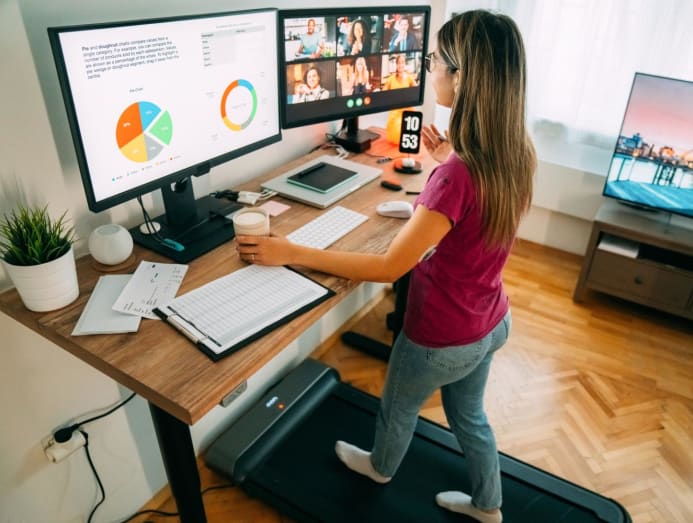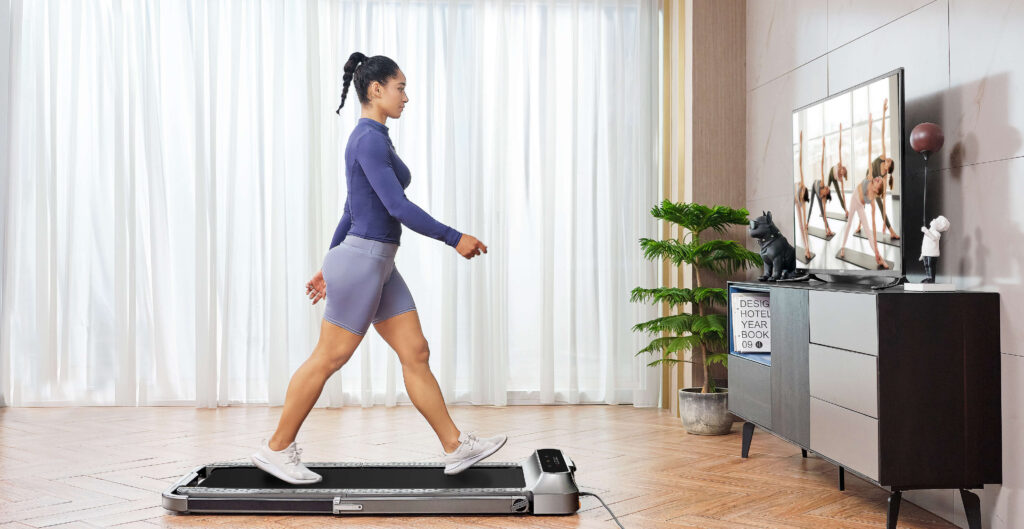Hey there! Wondering if using a walking pad can actually help you shed those extra pounds? Well, you’re in the right place! In this article, we’ll explore the effectiveness of walking pads in aiding weight loss. Can a simple device like a walking pad really make a difference in your fitness journey? Let’s find out!
What is a walking pad?
A walking pad is a innovative fitness equipment that allows you to walk or exercise in place without actually having to go outdoors or to a gym. This compact and portable device consists of a cushioned surface with a built-in motor that moves the track beneath your feet, creating the sensation of walking or running. It provides a convenient and effective way to get your daily steps in, regardless of the weather or time constraints. Walking pads are designed for individuals who want to incorporate more physical activity into their daily routine and are particularly popular among those looking to lose weight.
Understanding weight loss
Before delving into how walking pads can aid in weight loss, it’s important to understand the fundamentals of weight loss itself. At its core, weight loss is essentially a matter of consuming fewer calories than you burn. This creates a calorie deficit, prompting your body to tap into stored fat for energy. While diet plays a significant role in achieving a calorie deficit, exercise is crucial for boosting your metabolism, burning calories, and improving overall health. Walking, in particular, is a low-impact form of exercise that can be easily incorporated into a daily routine.
Calories and weight loss
Calories are the units of energy that fuel our bodies’ functions and physical activities. To achieve weight loss, you need to consume fewer calories than you expend. When you consume more calories than your body needs, the excess is stored as fat. On the other hand, when you create a calorie deficit by burning more calories than you consume, your body turns to its fat stores for energy, leading to weight loss. Walking on a regular basis helps increase your caloric expenditure, contributing to the calorie deficit necessary for weight loss.
Exercise and weight loss
Exercise is a crucial component of any weight loss journey, as it not only helps burn calories but also promotes cardiovascular health, strengthens muscles, and improves overall fitness. Engaging in regular exercise helps increase your basal metabolic rate (BMR), which is the number of calories your body burns at rest. This increase in BMR means that you burn more calories even when you’re not active. Walking is an accessible form of exercise that can easily be incorporated into your daily routine, making it an ideal choice for those seeking weight loss.
The role of walking in weight loss
Walking is a low-impact exercise that can be performed by people of all fitness levels. It is a natural movement that doesn’t put excessive strain on the joints, making it a safe and sustainable option for weight loss. Walking helps increase your heart rate, boost circulation, and engage various muscle groups, resulting in improved cardiovascular health and increased calorie burn. By incorporating walking into your daily routine, you can gradually increase your endurance, burn calories, and contribute to your weight loss goals.
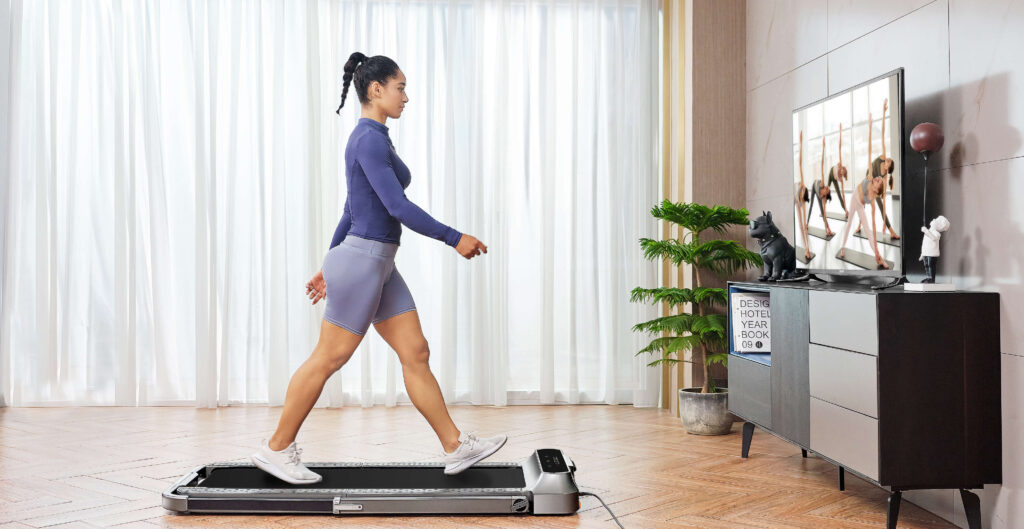
How does a walking pad work?
A walking pad operates using a motorized track that moves beneath your feet, creating the sensation of walking or running in place. These innovative devices are equipped with various features designed to enhance the walking experience and aid in weight loss. Let’s take a look at some of these features:
Features of a walking pad
- Motorized track: The motorized track is the core component of a walking pad. It moves beneath your feet at a set speed, mimicking the sensation of walking or running. The speed can usually be adjusted based on your fitness level and preferences.
- Cushioned surface: Walking pads typically feature a cushioned surface that provides comfort and support for your joints and feet. This helps reduce strain and impact, making it a gentle option suitable for individuals with joint issues or injuries.
- Compact and foldable design: Most walking pads are compact and lightweight, making them easy to store and transport. They often feature a foldable design, allowing you to conveniently fold and tuck them away when not in use.
- Adjustable incline: Some walking pads offer an adjustable incline feature, allowing you to simulate walking uphill. This adds intensity to your workout and helps activate different muscle groups, providing a more well-rounded exercise experience.
Benefits of using a walking pad
- Convenience: One of the key advantages of using a walking pad is its convenience. With a walking pad, you can walk or exercise in the comfort of your own home, at any time that suits you. You no longer have to worry about unfavorable weather conditions, busy gyms, or time constraints. This convenience makes it easier to stick to a regular exercise routine, which is crucial for long-term weight loss success.
- Accessibility: Walking pads are accessible to people of all fitness levels. Whether you are a beginner or an advanced exerciser, walking pads can be adjusted to match your fitness level. You can start with a slower pace and gradually increase the intensity as your fitness improves. Walking pads also provide a low-impact option for individuals with joint issues or injuries, allowing them to engage in physical activity without putting excessive strain on their bodies.
- Versatility: In addition to walking, many walking pads offer the option to jog or run. This versatility allows you to switch up your workouts and cater to your fitness goals and preferences. You can adjust the speed and incline to create a more challenging workout or simply use the walking pad for a leisurely stroll.
- Tracking and monitoring: Some walking pads come equipped with tracking features, such as distance, speed, and calorie counters. These features allow you to keep track of your progress, set goals, and monitor your calorie expenditure. This can be highly motivating and provide a tangible way to measure your weight loss efforts.
Research on walking pads and weight loss
As walking pads have gained popularity in recent years, several studies have been conducted to investigate their effectiveness in aiding weight loss. Let’s explore the findings and conclusions from some of these studies:
Studies investigating the effectiveness of walking pads
- A study published in the Journal of Strength and Conditioning Research examined the effects of using a walking pad on weight loss in sedentary adults. The study found that participants who incorporated regular walking pad sessions into their daily routine experienced significant reductions in body weight, body fat percentage, and waist circumference.
- Another study published in the Journal of Physical Therapy Science compared the effectiveness of walking on a treadmill versus a walking pad. The results showed that both modes of exercise were equally effective in promoting weight loss and improving cardiovascular fitness. Participants who used a walking pad reported similar improvements in body composition and cardiovascular health as those who used a treadmill.
Results and conclusions from the research
The research conducted on walking pads and weight loss consistently indicates that regularly incorporating walking pad sessions into your routine can lead to significant weight loss and improvements in body composition. These findings suggest that walking pads can be a valuable tool in achieving and maintaining a healthy weight.
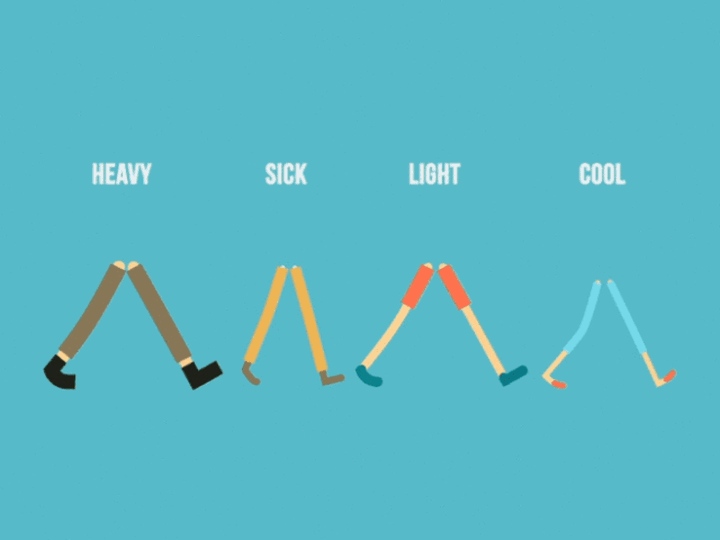
Factors to consider before purchasing a walking pad
If you’re considering purchasing a walking pad, there are several factors you should take into account to ensure you choose the right one for your needs. Here are some key factors to consider:
Price and affordability
Walking pads come in a range of prices, and it’s important to determine your budget before making a purchase. Consider the features and quality you desire and find a walking pad that fits within your price range. Remember that a higher price doesn’t always guarantee better quality, so be sure to read reviews and do your research before making a decision.
Size and portability
Evaluate the size and portability of the walking pad. Consider the available space in your home or apartment and ensure that the dimensions of the walking pad are suitable for your needs. If you have limited space, look for a walking pad that is compact and easily foldable for convenient storage. Additionally, if you plan on traveling or moving your walking pad frequently, opt for a lightweight and portable model.
Weight capacity
Every walking pad has a specified weight capacity, so it’s crucial to select a model that can accommodate your body weight. Exceeding the weight limit can not only damage the walking pad but also compromise your safety and comfort during use. Be sure to check the weight capacity and choose a model that can support your weight.
Additional features
Consider any additional features or functionalities that may enhance your walking pad experience. Some walking pads come with Bluetooth connectivity, allowing you to connect your smartphone or fitness tracker for real-time data tracking. Others may offer pre-programmed workouts or adjustable incline settings. Assess the features that are important to you and choose a walking pad that offers those functionalities.
Tips for maximizing weight loss with a walking pad
While using a walking pad can be beneficial for weight loss, it’s important to maximize its effectiveness by incorporating certain strategies into your routine. Here are some tips for maximizing weight loss with a walking pad:
Setting realistic goals
Set realistic and achievable goals based on your current fitness level and weight loss aspirations. Start by aiming for a certain number of steps or minutes of walking per day and gradually increase the intensity and duration as you progress. By setting realistic goals, you’ll be more likely to stay motivated and committed to your weight loss journey.
Establishing a consistent routine
Consistency is key when it comes to achieving weight loss. Establish a consistent walking routine by scheduling regular walking pad sessions into your daily or weekly calendar. Treat these sessions as non-negotiable appointments with yourself, and make them a priority. By making walking a consistent part of your routine, it will become a habit that is easier to maintain in the long run.
Incorporating other forms of exercise
While walking on a pad is a great form of exercise, incorporating other types of exercise can further enhance your weight loss efforts. Consider adding strength training exercises, such as bodyweight exercises or using resistance bands, to your routine. Strength training helps build lean muscle mass, which boosts your metabolism and increases calorie burn even at rest.
Monitoring progress
Keep track of your progress using the tracking features available on your walking pad or through a fitness tracker or smartphone app. Regularly record your steps, distance walked, and calories burned to monitor your progress over time. This feedback can provide motivation and accountability, as well as help you identify areas for improvement.
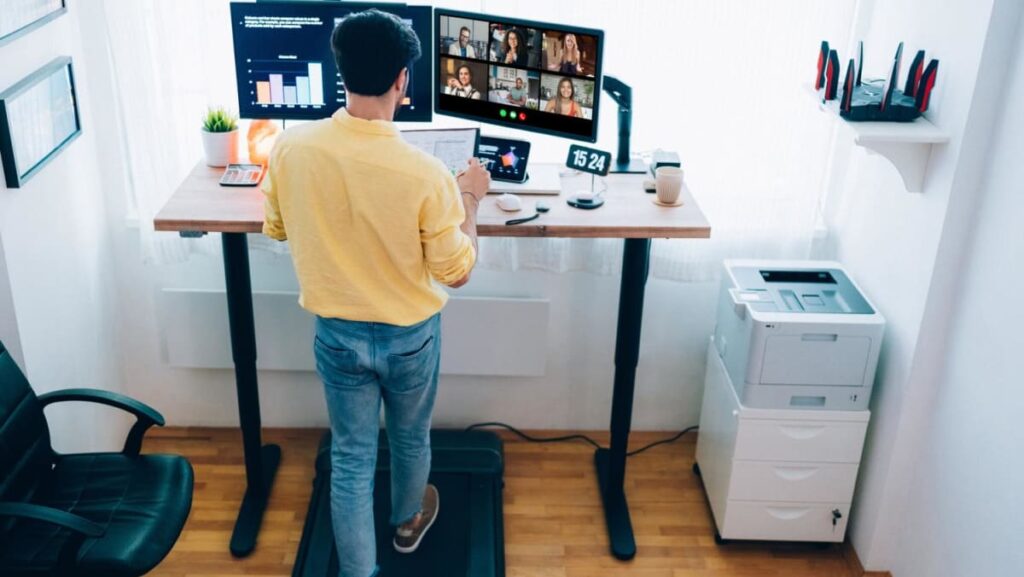
User reviews and opinions
To further understand the experiences and challenges faced by users of walking pads, let’s explore some positive and negative reviews:
Positive experiences with walking pads for weight loss
Many users have reported positive experiences with walking pads in their weight loss journey. They appreciate the convenience and accessibility of exercising at home without the need for expensive gym memberships. Users have also noted improvements in their overall fitness level, including increased endurance and strength. Some have even praised the versatility of walking pads, as they can be used for walking, jogging, or running, depending on individual preferences and goals.
Negative experiences and challenges faced
Some users have expressed challenges and limitations with using walking pads for weight loss. Due to the repetitive nature of walking in place, they found it difficult to stay motivated and engaged during longer sessions. Others have faced technical issues with their walking pads, such as noise from the motor or track malfunctions. It’s also important to note that while walking pads can aid in weight loss, they should be complemented with a healthy diet and overall lifestyle for optimal results.
Expert opinions on the effectiveness of walking pads for weight loss
To gain insights from fitness trainers and medical professionals, let’s explore their opinions on the effectiveness of walking pads for weight loss:
Fitness trainers and professionals
Fitness trainers often recommend walking pads for individuals looking to lose weight or incorporate more physical activity into their daily routine. They emphasize the convenience and accessibility of walking pads, as they eliminate barriers such as unfavorable weather or lack of time. Trainers also highlight the importance of gradually increasing the intensity and duration of walking pad sessions to maximize weight loss results.
Medical experts and professionals
Medical experts acknowledge walking pads as a viable option for weight loss, particularly for individuals who are unable to engage in high-impact exercises due to joint issues or injuries. They emphasize the importance of regular physical activity for overall health and weight management. Medical professionals often recommend walking pads as a practical and sustainable exercise solution for individuals of all fitness levels, as they provide a low-impact option that is easy to incorporate into daily life.

Frequently asked questions about walking pads and weight loss
Here are the answers to some frequently asked questions about walking pads and weight loss:
Can walking on a pad alone help with weight loss?
Walking on a pad alone can contribute to weight loss when combined with a calorie-controlled diet and overall healthy lifestyle. Regular walking sessions on a walking pad can increase caloric expenditure and help create a calorie deficit, leading to weight loss over time.
How long should I walk on a pad to see results?
The duration of walking sessions on a pad depends on various factors, including your current fitness level, weight loss goals, and overall health. Starting with shorter sessions, such as 20-30 minutes, and gradually increasing the duration is a good approach. Consistency is key, so aim for at least 150 minutes of moderate-intensity walking per week for optimal weight loss results.
Can walking pads be used by people of all fitness levels?
Yes, walking pads can be used by people of all fitness levels. They offer adjustable speed settings, allowing you to start at a pace that suits your current fitness level and gradually increase the intensity as your fitness improves. Walking pads also provide a low-impact option, making them suitable for individuals with joint issues or injuries.
Are there any potential risks or drawbacks of using a walking pad?
While walking pads are generally safe and beneficial for most individuals, there are a few potential risks or drawbacks to consider. Repetitive movements associated with walking in place can strain certain muscles or joints if proper form and posture are not maintained. It’s important to listen to your body and make adjustments as needed. Some users have also reported technical issues with their walking pads, so it’s important to choose a reputable brand and read reviews before making a purchase.
Conclusion
Walking pads offer an innovative and convenient solution for incorporating physical activity into your daily routine and achieving weight loss goals. By considering factors such as price, size, weight capacity, and additional features, you can choose a walking pad that suits your needs. Pairing regular walking pad sessions with a calorie-controlled diet, establishing a consistent routine, and incorporating other forms of exercise can maximize weight loss results. With the positive experiences shared by users and endorsements from fitness trainers and medical professionals, it’s clear that walking pads can be an effective tool in your weight loss journey. Remember to consult with your healthcare provider before starting any new exercise program, especially if you have any underlying health conditions. Lace up your sneakers, step onto your walking pad, and take the first steps towards achieving your weight loss goals.
